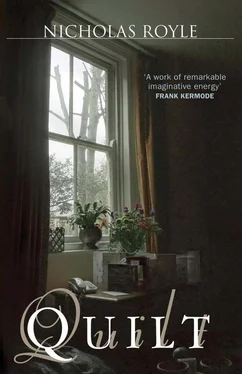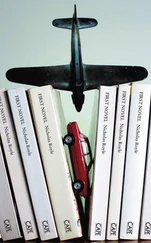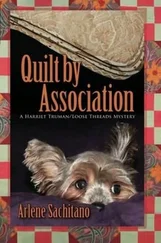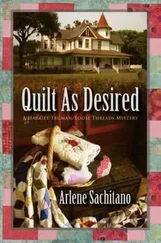Nicholas Royle - Quilt
Здесь есть возможность читать онлайн «Nicholas Royle - Quilt» весь текст электронной книги совершенно бесплатно (целиком полную версию без сокращений). В некоторых случаях можно слушать аудио, скачать через торрент в формате fb2 и присутствует краткое содержание. Год выпуска: 2011, Издательство: Myriad Editions, Жанр: Современная проза, на английском языке. Описание произведения, (предисловие) а так же отзывы посетителей доступны на портале библиотеки ЛибКат.
- Название:Quilt
- Автор:
- Издательство:Myriad Editions
- Жанр:
- Год:2011
- ISBN:нет данных
- Рейтинг книги:4 / 5. Голосов: 1
-
Избранное:Добавить в избранное
- Отзывы:
-
Ваша оценка:
- 80
- 1
- 2
- 3
- 4
- 5
Quilt: краткое содержание, описание и аннотация
Предлагаем к чтению аннотацию, описание, краткое содержание или предисловие (зависит от того, что написал сам автор книги «Quilt»). Если вы не нашли необходимую информацию о книге — напишите в комментариях, мы постараемся отыскать её.
Quilt — читать онлайн бесплатно полную книгу (весь текст) целиком
Ниже представлен текст книги, разбитый по страницам. Система сохранения места последней прочитанной страницы, позволяет с удобством читать онлайн бесплатно книгу «Quilt», без необходимости каждый раз заново искать на чём Вы остановились. Поставьте закладку, и сможете в любой момент перейти на страницу, на которой закончили чтение.
Интервал:
Закладка:
— What do you mean?
— I mean blind. I catch myself staring, as if I’m simply failing to shut my eyes, and what I see is dissolving. It’s as if I couldn’t sleep, but I go out like a light. Things appear bright and blurred at the same time.
— That’s just what you’ve been going through, the burden and strain of everything. It will get better. Try to sleep longer tonight. Have a lie-in.
But the thing persists. A couple of days later you refer again to troubled vision and then, after a pause:
— I’m overlooking myself.
Sometimes I wonder if I hear you correctly, your accent foreign and still unfamiliar (doubtless in part that is why I love your voice), an impression accentuated by the telephone and hundreds of miles between us. One cannot endlessly ask, Could you say that again? or Did you say you’re overlooking? Signifying what? A surreal game of Whisper Down the Lane tracks our every syllable.
— In France they call it Arab Phone.
— Sounds offensive. What are you talking about?
— No more than calling it Chinese Whispers. I’m sorry, I was thinking out loud. It took a moment to realise you said ‘overworking’…
— I didn’t. I said I’m overlooking. But you’re right, as always, my love: I don’t actually know what I meant by it. We might have invented another game: Overlook .
— What is this? Shakespeare meets Stephen King?
— Sorry. It’s an odd word, I see that. I’m overlooked in my birth.
— I guess you’re overlooking the rays.
— Yes, I’m looking after them. But I only meant I have this strange feeling of looking too much, seeing too hard. Like I said, things are blurred and bright at the same time.
— So: go to a doctor or optometrist or whatever.
There follows soon afterwards a torturously lengthy examination process at the local optician’s, with the optometrist over-close, fitting the measuring cage to the face, quietly spoken, insinuatingly moralistic:
— And when did you last have an eye-test, sir?
The examination seems interminable.
— I’m now going to shine this light into your right eye, sir. Very bright is it, sir? We’re almost done here, if you can just bear with me for a few more minutes. Turn to the right, please: look straight ahead. That’s splendid. And to the left…
— Hmm, says the optometrist finally, his breath cloudy in your face: That’s not so good.
Yes, finally you are told, your eyes have grown markedly weaker, and new glasses are provided with unexpectedly promptness.
— Are they helping? I ask him in due course, as easy-going as I can.
— Let’s wait and see.

You are an increasing worry, more elusive, desultory. I miss you intensely and wish I could join you but work commitments prevent me for at least three months. In the past we have undergone longer periods of being apart, but now things seem more precarious and difficult.
There’s no substrate, you say.
Words appear to you in a dream: ‘In the grave you hear no sound / But all the things in the ground.’ And then another time: ‘The asseveration comes in the night.’
You keep dreaming that you are late for the funeral. You miss it altogether. You miss most of the reception as well, like the cousin who turns up only at the end. You haven’t organised anything properly. You still have to do the gravel. This recurrent nightmare proceeds, you believe, from a sense of outrage at the so-called specialists who have the gall to suggest that there is no need for a substrate . It may come as quite a surprise for the creatures on arrival and they will certainly experience discomfort, for they are accustomed to using their pelvic fins for shifting through the substrate and they’ll find themselves slipping horribly. But they can get used to it, these specialists imply, as if these creatures that so love to bury themselves, whether out of sudden fear or simply in order to express a deep behavioural instinct, the delight in covering themselves so that only the eyes protrude, and the joy in blowing water into the substrate, to spout up morsels of food, could readily adapt to the imposition of a completely different, nonspecific gravity, the carpet pulled out from under their ghost-white bellies.
I remember when you first mentioned these creatures, around the time of your mother’s death. You came to see me, not long after, and said in the car as I was driving us out of the airport that you’d like to visit a sea-life centre of some kind to see if they had any rays. What a strange man, I thought, how I love you. Who else would come out with a remark like that, more or less the first thing you say to someone having not seen them in several months?
And so the next day we located somewhere, in fact one of the oldest aquaria in the country, in a little seaside town a couple of hours’ drive away, and sure enough they had a ray pool or, as they called it, a touchpool. It was in that dead period, no longer winter, not yet spring, with a raw wind blowing off the ocean, and we were the only ones there, besides the girl who worked at the aquarium who was feeding them. It was the first of many trips to marine-life centres, but I’ll never forget the strangeness of that first time. I don’t think I had ever in my life really looked at a ray or given a moment’s reflection to the subject. I guess I fed off your fascination, and also caught something from the girl, since she seemed surprisingly well-informed about these creatures and at the same time obviously fond of them. It still feels odd to talk of being fond of rays, I guess, but standing there with you and the girl (despite the freezing cold and gray blank of the afternoon) I came to share something of what you called this ‘new imaginary’. I mean, when I looked at these fish, really looked at one, for the first time, up close, in detail: weird !
Of course we didn’t know at this time about the injurious effects of touchpools. The girl eventually asked would you like to touch one. I said, don’t they sting? She said they’ve had them removed. An image of strange pathos came into my mind: the art of archery, without arrows. It’s a constant discombobulation to reflect on what we overlook, for of course then it was plain as day the creatures at the base of their tails featured these pinkish stumps. Your distaste for the trade began right then: I could see it. Driving back to my apartment I saw that you were sobbing. I assumed it had to do with your mother, but all you said was:
— Those pointless stumps!
On later trips to marine-life centres you would often become visibly enraged at seeing the spines had been snipped off, if that’s the right phrase. Doubtless an understatement. ‘Sawn off’ is more apt, more in accord with the brutality of the act, even if it is done with an anaesthetic like Finquel.
The first we witnessed were a cow-nose variety, not the loveliest on the eye, but still they were eerily engrossing. Even then, on that first encounter, when the girl invited you, you wouldn’t touch. Already there was a certain reserve in relation to these creatures who were to acquire such centrality in our life. I couldn’t simply say they were beautiful, because there is also something uncomfortably negative about them. They’re never exactly a happy-go-lucky sight. They always remain wayward. Irreproachably creatures of elsewhere is how I think of them. Even if you are close, as we were that afternoon, to this fellow with a sad stump rendering him completely harmless, and he comes bobbing up through the surface and looks up at you like a blind pet spaniel. You can feel you’re infinitely far away from him, but still there’s this singular unease he generates. Gazing in a quite detached way, just as you might find yourself other creatures in an aquarium such as sharks, still you get caught up short somehow. You are unable to have a clear impression of what perspective or dimension to look at them from. Are they upside down or back to front, fat or thin, facing you or away? How can this creature be looking at me? Fish don’t look at you. Makes no sense.
Читать дальшеИнтервал:
Закладка:
Похожие книги на «Quilt»
Представляем Вашему вниманию похожие книги на «Quilt» списком для выбора. Мы отобрали схожую по названию и смыслу литературу в надежде предоставить читателям больше вариантов отыскать новые, интересные, ещё непрочитанные произведения.
Обсуждение, отзывы о книге «Quilt» и просто собственные мнения читателей. Оставьте ваши комментарии, напишите, что Вы думаете о произведении, его смысле или главных героях. Укажите что конкретно понравилось, а что нет, и почему Вы так считаете.












